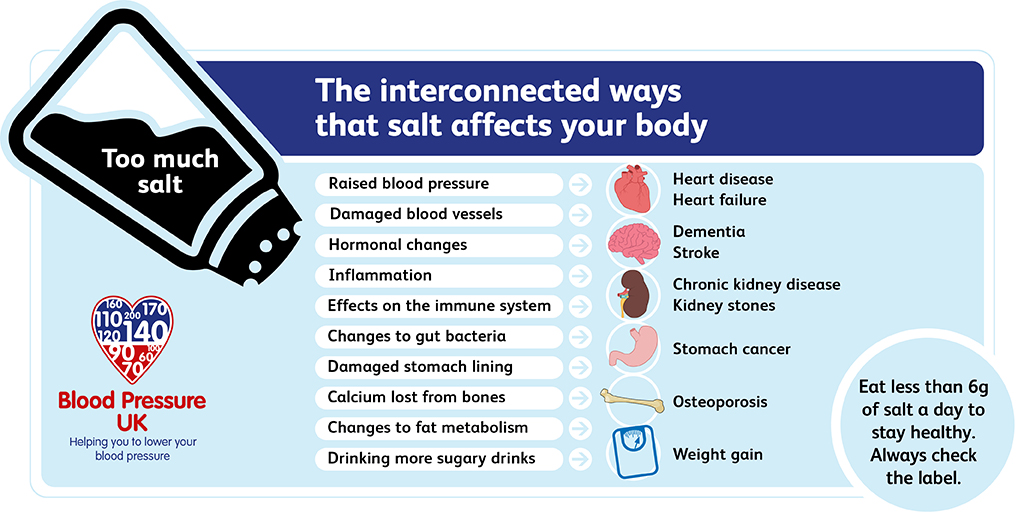Does Salt Under Your Tongue Increase Blood Flow?
For centuries, people have sought unconventional methods to enhance their health and well-being, often turning to natural remedies or folk practices. One such claim that has sparked curiosity is whether placing salt under your tongue can increase blood flow. While the idea might sound intriguing, it's essential to examine the science behind this belief to understand its validity. In this article, we will delve into the topic, exploring the potential effects of salt under the tongue on blood circulation.
This article aims to provide a comprehensive understanding of the relationship between salt and blood flow. We'll also discuss the physiological mechanisms involved, potential risks, and alternative methods for improving circulation. By the end of this article, you will have a clearer picture of whether this practice holds any merit or if it's merely a myth.
Before we dive deeper, it's important to note that this topic falls under the YMYL (Your Money or Your Life) category, as it pertains to health and well-being. Therefore, the information provided here is backed by scientific research and expert opinions to ensure accuracy and reliability.
Read also:What Is Www Naughty A Comprehensive Guide To Understanding Its Impact And Significance
Table of Contents
- Introduction to Salt Under the Tongue
- How Does Salt Affect the Body?
- Salt Under the Tongue and Blood Flow
- Scientific Studies on Salt and Circulation
- Risks and Side Effects
- Alternative Methods to Improve Blood Flow
- Common Myths About Salt
- Expert Opinions and Recommendations
- Conclusion and Final Thoughts
- Frequently Asked Questions
Introduction to Salt Under the Tongue
Salt has been a staple in human diets for thousands of years. Beyond its role as a flavor enhancer, salt plays a vital role in maintaining bodily functions, including fluid balance and nerve transmission. However, the practice of placing salt under the tongue has gained attention in recent years, with some proponents claiming it can improve circulation and overall health.
Why Do People Use Salt Under the Tongue?
The belief in salt's ability to enhance blood flow stems from the idea that it can be absorbed directly into the bloodstream through the mucous membranes under the tongue. This rapid absorption is thought to deliver essential minerals directly to the body, potentially boosting circulation. However, scientific evidence supporting this claim is limited.
Historical Use of Salt in Traditional Medicine
Historically, salt has been used in various traditional medicine practices for its purported health benefits. In some cultures, it is believed to have detoxifying properties and is used to treat ailments ranging from fatigue to poor circulation. While these practices may have anecdotal support, modern science often demands more rigorous testing before drawing conclusions.
How Does Salt Affect the Body?
Salt, primarily composed of sodium chloride, is an essential nutrient required for proper bodily function. However, excessive consumption of salt can lead to adverse health effects, such as high blood pressure and cardiovascular issues.
Role of Sodium in Blood Pressure Regulation
Sodium plays a critical role in regulating blood pressure. When consumed in excess, it can cause the body to retain water, increasing blood volume and placing additional strain on the heart and blood vessels. This is why individuals with hypertension are often advised to limit their salt intake.
Impact of Salt on Blood Flow
While salt is essential for maintaining fluid balance, its direct impact on blood flow is more complex. Excessive sodium intake can lead to vasoconstriction, narrowing blood vessels and reducing blood flow. Conversely, moderate sodium levels are necessary for optimal vascular function.
Read also:Does Queen Latifah Have Kids Exploring Her Personal Life And Legacy
Salt Under the Tongue and Blood Flow
The claim that placing salt under the tongue can increase blood flow is based on the premise of rapid absorption. However, the actual mechanism by which this occurs remains unclear.
How Is Salt Absorbed Under the Tongue?
When salt is placed under the tongue, it dissolves in saliva and is absorbed through the mucous membranes. This method of absorption bypasses the digestive system, allowing for faster delivery of sodium into the bloodstream. However, the amount of sodium absorbed in this manner is relatively small compared to dietary intake.
Potential Benefits for Blood Flow
Proponents argue that the rapid absorption of sodium under the tongue can temporarily improve blood flow by increasing vascular dilation. However, scientific evidence supporting this claim is limited, and more research is needed to confirm its validity.
Scientific Studies on Salt and Circulation
Several studies have explored the relationship between salt intake and circulation, yielding mixed results. While some research suggests that moderate sodium levels are necessary for optimal vascular function, excessive consumption can have detrimental effects.
Key Findings from Recent Research
A study published in the Journal of Hypertension found that high sodium intake was associated with reduced blood flow in individuals with hypertension. Conversely, another study in the American Journal of Physiology highlighted the importance of maintaining balanced sodium levels for vascular health.
Limitations of Current Research
Despite these findings, the specific effects of salt under the tongue on blood flow remain largely unexplored. Most studies focus on dietary sodium intake rather than alternative methods of absorption. Further research is needed to clarify the potential benefits and risks of this practice.
Risks and Side Effects
While placing salt under the tongue may seem harmless, it is not without risks. Excessive sodium intake, even through non-traditional methods, can lead to adverse health effects.
Potential Health Risks
- High blood pressure
- Cardiovascular disease
- Fluid retention
- Kidney damage
Who Should Avoid This Practice?
Individuals with hypertension, heart disease, or kidney issues should exercise caution when considering this practice. Consulting a healthcare professional is advisable before attempting any new health regimen.
Alternative Methods to Improve Blood Flow
While the effectiveness of salt under the tongue remains uncertain, several proven methods can enhance blood circulation. These include lifestyle changes, dietary modifications, and exercise.
Exercise for Improved Circulation
Regular physical activity is one of the most effective ways to boost blood flow. Activities such as walking, swimming, and cycling can improve cardiovascular health and promote optimal circulation.
Healthy Diet and Hydration
A balanced diet rich in fruits, vegetables, and whole grains can support vascular health. Staying hydrated is also essential for maintaining proper blood flow and preventing dehydration-related issues.
Common Myths About Salt
There are several misconceptions surrounding salt and its effects on the body. Separating fact from fiction is crucial for making informed health decisions.
Myth: All Salt Is Harmful
While excessive sodium intake can be detrimental, moderate consumption is necessary for maintaining bodily functions. Choosing unrefined or natural salts, such as Himalayan or sea salt, may offer additional health benefits.
Myth: Salt Under the Tongue Cures All Ailments
While some proponents claim that salt under the tongue can treat various conditions, there is little scientific evidence to support these claims. It is important to rely on evidence-based medicine for treating health issues.
Expert Opinions and Recommendations
Healthcare professionals emphasize the importance of moderation when it comes to salt consumption. While salt under the tongue may offer temporary benefits, it should not replace conventional methods for improving circulation.
Advice from Nutritionists
Nutritionists recommend focusing on a balanced diet and lifestyle to support vascular health. Limiting processed foods, which are often high in sodium, and opting for natural, whole foods can help maintain optimal sodium levels.
Consulting a Healthcare Professional
Before attempting any new health practice, it is advisable to consult a healthcare professional. They can provide personalized recommendations based on your individual health needs and conditions.
Conclusion and Final Thoughts
In conclusion, the claim that salt under the tongue increases blood flow remains largely unproven. While there may be some anecdotal support for this practice, scientific evidence is limited. For those seeking to improve circulation, focusing on proven methods such as exercise, a healthy diet, and hydration is recommended.
We invite you to share your thoughts and experiences in the comments below. If you found this article helpful, consider sharing it with others who may benefit from the information. For more insights on health and wellness, explore our other articles on the site.
Frequently Asked Questions
1. Is Salt Under the Tongue Safe?
Placing salt under the tongue is generally considered safe in moderation. However, excessive sodium intake, regardless of the method, can lead to adverse health effects.
2. How Much Salt Should I Use?
It is advisable to use only a small amount of salt under the tongue. Exceeding recommended daily sodium intake can have detrimental effects on health.
3. Can Salt Under the Tongue Replace Medication?
No, salt under the tongue should not replace prescribed medication for treating health conditions. Always consult a healthcare professional before making any changes to your treatment plan.
4. Are There Any Natural Alternatives?
Yes, several natural alternatives, such as herbal supplements and dietary changes, can support vascular health. However, their effectiveness may vary depending on individual needs.
5. Where Can I Find More Information?
For more information on salt and its effects on health, consult reputable sources such as the World Health Organization (WHO) or the American Heart Association (AHA).
Article Recommendations


